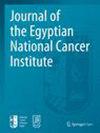miR-939, as an important regulator in various cancers pathogenesis, has diagnostic, prognostic, and therapeutic values: a review
IF 2.1
Q3 ONCOLOGY
Journal of the Egyptian National Cancer Institute
Pub Date : 2024-04-29
DOI:10.1186/s43046-024-00220-8
引用次数: 0
Abstract
MicroRNAs (miRNAs or miRs) are highly conserved non-coding RNAs with a short length (18–24 nucleotides) that directly bind to a complementary sequence within 3′-untranslated regions of their target mRNAs and regulate gene expression, post-transcriptionally. They play crucial roles in diverse biological processes, including cell proliferation, apoptosis, and differentiation. In the context of cancer, miRNAs are key regulators of growth, angiogenesis, metastasis, and drug resistance. This review primarily focuses on miR-939 and its expanding roles and target genes in cancer pathogenesis. It compiles findings from various investigations. MiRNAs, due to their dysregulated expression in tumor environments, hold potential as cancer biomarkers. Several studies have highlighted the dysregulation of miR-939 expression in human cancers. Our study highlights the potential of miR-939 as a valuable target in cancer diagnosis, prognosis, and treatment. The aberrant expression of miR-939, along with other miRNAs, underscores their significance in advancing our understanding of cancer biology and their promise in personalized cancer care.miR-939 是多种癌症发病机制的重要调节因子,具有诊断、预后和治疗价值:综述
微小 RNA(miRNA 或 miRs)是高度保守的非编码 RNA,长度较短(18-24 个核苷酸),可直接与目标 mRNA 的 3′-非翻译区内的互补序列结合,通过转录后调节基因表达。它们在细胞增殖、凋亡和分化等多种生物过程中发挥着至关重要的作用。在癌症方面,miRNA 是生长、血管生成、转移和耐药性的关键调节因子。本综述主要关注 miR-939 及其在癌症发病机制中不断扩展的作用和靶基因。它汇集了各种研究结果。由于在肿瘤环境中表达失调,MiRNA 具有作为癌症生物标志物的潜力。一些研究强调了 miR-939 在人类癌症中的表达失调。我们的研究强调了 miR-939 作为癌症诊断、预后和治疗的重要靶点的潜力。miR-939 和其他 miRNA 的异常表达突出了它们在促进我们对癌症生物学的理解方面的重要性,以及它们在个性化癌症治疗方面的前景。
本文章由计算机程序翻译,如有差异,请以英文原文为准。
求助全文
约1分钟内获得全文
求助全文
来源期刊
CiteScore
3.50
自引率
0.00%
发文量
46
审稿时长
11 weeks
期刊介绍:
As the official publication of the National Cancer Institute, Cairo University, the Journal of the Egyptian National Cancer Institute (JENCI) is an open access peer-reviewed journal that publishes on the latest innovations in oncology and thereby, providing academics and clinicians a leading research platform. JENCI welcomes submissions pertaining to all fields of basic, applied and clinical cancer research. Main topics of interest include: local and systemic anticancer therapy (with specific interest on applied cancer research from developing countries); experimental oncology; early cancer detection; randomized trials (including negatives ones); and key emerging fields of personalized medicine, such as molecular pathology, bioinformatics, and biotechnologies.

 求助内容:
求助内容: 应助结果提醒方式:
应助结果提醒方式:


